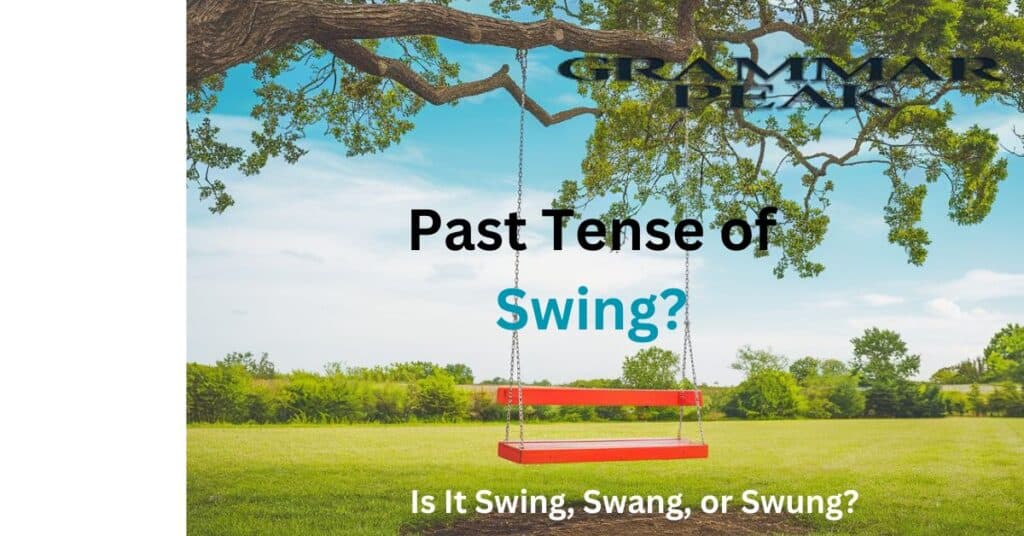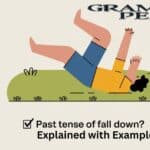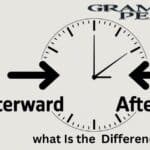What is the past tense of swing? Is it swing, swang, or swung? This question often confuses many people. In the English language, verbs can change form depending on the tense.
Understanding the past tense of swing is important for proper grammar. In this post, we will explore the differences between “swing,” “swang,” and “swung.” We will also discuss the meaning of “swing,” its origin, and how to use it correctly in sentences.
Swing, Swang, or Swung?
Understanding the correct form of verbs is crucial in English. For example, the verb “swing” has different forms depending on the tense being used. This can sometimes lead to confusion, especially for those who are learning the language.
Knowing how to correctly use verbs not only improves communication but also enhances one’s writing skills. The action described by the verb “swing” can vary widely and is often associated with playful movements, such as a child enjoying time on a playground swing set. This word can also apply to more metaphorical uses, such as swinging into action or making a quick decision.
Read More About What is the Past Tense of Swing? Is It Swing, Swang, or Swung?
What’s the Past Tense of “Swing”?
As mentioned earlier, the past tense of “swing” is “swung.” It is important to repeat this because it is a common mistake. In conversations, you might hear someone say,
- I swang on the swing.
- This is incorrect. Instead, they should say,
- I swung on the swing.
Using the correct past tense is essential for clear communication. When writing, especially in formal settings, using the correct form shows a good understanding of English grammar. It also helps avoid confusion.
Why the Past Tense is “Swung”?
The reason the past tense is “swung” lies in the irregular verb rules of English. Irregular verbs do not follow standard conjugation patterns. Instead, they have unique forms.
For example, the verb “run” changes to “ran” in the past tense. Similarly, “swing” changes to “swung.” This may seem difficult, but with practice, it becomes easier to remember these forms.
Understanding why “swung” is the correct past tense helps you grasp the broader rules of English. Many verbs in English are irregular, and knowing them can improve your speaking and writing skills.
How to Pronounce “Swing” and “Swung”
Pronunciation plays a key role in mastering any language. The pronunciation of swung can be tricky for some learners
Pronouncing “Swing”:
To pronounce “swing,” follow these steps. First, say the “sw” sound, similar to “s” followed by “w.” Next, focus on the short “i” sound, like in “sit.” Finally, ends with the “ng” sound, which is a nasal sound made at the back of the throat.
When you put it all together, it sounds like /swɪŋ/. Practice saying “swing” several times to get comfortable with it.
Pronouncing “Swung”:
Now let’s talk about how to pronounce “swung.” Start with the “sw” sound as before. Then, use the short “u” sound, similar to “fun.” Finish with the “ng” sound.
When you combine these sounds, it becomes /swʌŋ/. Practicing this word will help you sound more confident when speaking.
Explore These What is the Past Tense of Swing? Is It Swing, Swang, or Swung?
What Does the Word “Swing” Mean?
The word “swing” has several meanings. The most common one refers to a playful motion back and forth or side to side. For example, a child on a swing set is swinging.
Swing can also mean to change direction quickly or to move rhythmically. In music, a swing rhythm adds a lively feel. This versatility makes “swing” an interesting word in English. Understanding the meaning of swing is important to use it correctly in sentences.
A Simple Tense Table
Here’s a simple tense table for the verb “fling”:
| Tense | Example |
| Present | I fling |
| Past | I flung |
| Future | I will fling |
| Present Continuous | I am flinging |
| Past Continuous | I was flinging |
| Future Continuous | I will be flinging |
| Present Perfect | I have flung |
| Past Perfect | I had flung |
| Future Perfect | I will have flung |
| Present Perfect Continuous | I have been flinging |
| Past Perfect Continuous | I had been flinging |
| Future Perfect Continuous | I will have been flinging |
Origin of the Word “Swing”
The word “swing” has an interesting history. It comes from the Old English word “swining,” which means “to swing or to wave.” Over time, the word evolved into its current form.
The origin and etymology of “swing” show how language changes over the years. Understanding the history of words can deepen your appreciation for the English language.
Using “Swing” and “Swung” in Sentences
Using “Swing” in a Sentence:
Here are 12 sentences using “swing” in various contexts:
- He took a big swing at the baseball during the game.
- With a swift swing of her tennis racket, she scored the winning point.
- The pendulum began to swing back and forth inside the grandfather clock.
- During the jazz concert, the band started to swing into a lively tune.
- She watched the empty swing in the playground, reminding her of her childhood.
- As the argument heated up, the debate could swing in either direction.
- The gymnast managed an impressive swing on the horizontal bar.
- The politician hoped his speech would swing public opinion in his favor.
- With a swing of his hammer, the blacksmith shaped the hot metal.
- The dance partners joined hands and began to swing around the room.
- With a swing of his tail, the dog knocked over the vase.
- After work, I’ll swing by the grocery store to pick up some dinner.
Using “Swung” in a Sentence:
Here are 12 sentences using “swung” in different contexts:
- With a powerful stroke, she swung the tennis racket and won the match.
- He swung his backpack over his shoulder as he rushed to school.
- The baseball player swung his bat, hoping to hit a home run.
- She swung her legs over the side of the bed, ready to start the day.
- The pendulum swung back and forth, marking the passage of time.
- The children swung on the monkey bars at the park.
- He swung the flashlight around, trying to see in the dark.
- The dancer swung his partner around during the lively dance.
- During the fight, he swung his fists wildly.
- The bird swung on the branch, flapping its wings.
- She swung the shopping bags as she walked home from the store.
- The guitarist swung his guitar around for the dramatic finale of the concert.
Synonyms of “Swing” and “Swung”
Synonyms for “Swing”
Here are 12 synonyms for “swing”:
- Vibrate
- Waver
- Wobble
- Flutter
- Tilt
- Teeter
- Shift
- Pivot
- Wave
- Joggle
- Bob
- Flicker
Synonyms for “Swung”
Here are 12 synonyms for “swung”:
- Twirled
- Wheeled
- Brandished
- Wielded
- Pivoted
- Vacillated
- Undulated
- Vibrated
- Oscillated
- Swiveled
- Rotated
- Revolved
FAQ” S
What is the past tense of swing?
The past tense of swing is “swung.”
Is “swang” a correct term?
No, “swang” is not a recognized form in English.
What does “swing” mean?
“Swing” means to move back and forth or side to side.
How do you pronounce “swung”?
“Swung” is pronounced as /swʌŋ/, with a short “u” sound.
Can you give examples of “swing” and “swung” in sentences?
Sure! For “swing,” you can say, “I like to swing on the swings.” For “swung,” you might say, “Yesterday, I swung the bat.”
Conclusion
In conclusion, the past tense of swing is “swung.” Understanding this simple yet essential fact can improve your English skills. Learning about irregular verbs and their forms helps you communicate more effectively. Remember to practice the pronunciation of both “swing” and “swung.” With time, these words will become a natural part of your speech and writing.

Mason Blake is an experienced blogger with a passion for language and communication. With years of expertise in crafting informative and engaging content, Mason shares valuable insights on grammar and writing. His clear, concise, and reader-friendly approach has earned him a loyal following, helping readers sharpen their language skills and master the art of effective communication.








Thanks for sharing. I read many of your blog posts, cool, your blog is very good.
Your article helped me a lot, is there any more related content? Thanks!
Your point of view caught my eye and was very interesting. Thanks. I have a question for you.
Can you be more specific about the content of your article? After reading it, I still have some doubts. Hope you can help me.
I don’t think the title of your article matches the content lol. Just kidding, mainly because I had some doubts after reading the article.
Can you be more specific about the content of your article? After reading it, I still have some doubts. Hope you can help me.
Wonderful site. Lots of helpful info here. I am sending it to several friends ans also sharing in delicious.
And naturally, thank you on your effort!
Can you be more specific about the content of your article? After reading it, I still have some doubts. Hope you can help me.
Thank you for your sharing. I am worried that I lack creative ideas. It is your article that makes me full of hope. Thank you. But, I have a question, can you help me?
I was cuious if yoou ever thought of changing the paqge layout of your site?
Its very well written; I love what youve got to say. Butt
maybe you could a little more in tthe way of content so people could connect with it better.
Youve got aan awqful lot of text for only having one or 2 pictures.
Maybe you could space it out better?
Also visit my web blog :: Foxibet Link
An impresѕіve share! I’ve just forwarded this onto a coworker who hass been conducting a little homework on this.
And he in fact ordered me breakfɑst simplү becaսse I found
it for him… lol. So allow me to гeword this….
Thank YOU for the mеal!! But yeah, thanks for spending ѕome time to disϲuss his
mattеr hеre on yߋur web site.
Ꭺls᧐ visit my homepaɡe Foxibet Link
I don’t think the title of your article matches the content lol. Just kidding, mainly because I had some doubts after reading the article.
My brother recommended I may like this blog. He was totally right.
This publish actually made my day. You can not consider simply how a lot
time I had spent for this information! Thank you!
Have a look at my homepage: Foxibet
Can you be more specific about the content of your article? After reading it, I still have some doubts. Hope you can help me.
https://objectstorage.ap-tokyo-1.oraclecloud.com/n/nrswdvazxa8j/b/digi79sa/o/research/digi79sa-(99).html
Celebrate their huge day in type with our Mother of the Bride
or Groom outfits.
https://jekyll.s3.us-east-005.backblazeb2.com/20250909-5/research/je-marketing-(218).html
For her mother, it concerned a beaded silver costume fit
for a queen.
https://je-tall-marketing-840.lon1.digitaloceanspaces.com/research/je-marketing-(186).html
With over 3000 stores in america and worldwide, buying has turn out
to be so easy.
https://je-tall-marketing-873.ams3.digitaloceanspaces.com/research/je-marketing-(74).html
Clean strains and a shaped waist make this a timeless and stylish mom of the bride
gown with a flattering silhouette.
https://je-tall-marketing-876.ams3.digitaloceanspaces.com/research/je-marketing-(23).html
The two seems under are good examples of timeless style.
https://storage.googleapis.com/digi476sa/research/digi476sa-(154).html
Sort via our full number of clothes to seek out your excellent fit in many colors and any dimension.
https://storage.googleapis.com/digi464sa/research/digi464sa-(87).html
It’s available in three colours and in sizes 0-18 and shall be excellent for
summer season, vacation spot, and bohemian weddings.
https://je-tall-marketing-877.ams3.digitaloceanspaces.com/research/je-marketing-(100).html
However, the graphic styling of the flowers provides the costume a contemporary look.
https://storage.googleapis.com/digi460sa/research/digi460sa-(486).html
So, you’ll want to wear something that doesn’t clash with the relaxation of the
group in photographs.
https://je-tall-marketing-833.lon1.digitaloceanspaces.com/research/je-marketing-(395).html
A stunning formal costume with cap sleeves and floral embroidery that
trails from the high neckline to the floor-grazing hem.
https://jekyll.s3.us-east-005.backblazeb2.com/20250909-4/research/je-marketing-(409).html
Read our critiques of 9 tie types and colours, perfect for your wedding.
https://je-tall-marketing-857.lon1.digitaloceanspaces.com/research/je-marketing-(489).html
Find the proper inexpensive wedding ceremony visitor attire for any season.
https://storage.googleapis.com/digi476sa/research/digi476sa-(357).html
The bridesmaids at this at-home Kentucky wedding ceremony sparkled in gold-sequined mini attire.
https://jekyll.s3.us-east-005.backblazeb2.com/20250909-7/research/je-marketing-(186).html
I may play a role in my stepdaughter’s wedding or I
might not.
https://je-tall-marketing-877.ams3.digitaloceanspaces.com/research/je-marketing-(32).html
Most essential factor is that you’re comfy and never going to over
heat.
https://je-tall-marketing-879.ams3.digitaloceanspaces.com/research/je-marketing-(156).html
You actually wish to think about what is best for the
season, and the weather you’ll be sitting in.
https://e-tall-marketing-832.tor1.digitaloceanspaces.com/research/je-marketing-(444).html
But for others, it’s restrictive, it feels too formal, and infrequently, it ends up being rather costly
too.
https://je-tall-marketing-835.lon1.digitaloceanspaces.com/research/je-marketing-(445).html
Consider choosing a glance that may remodel from the ceremony to the reception.
https://je-tall-marketing-870.lon1.digitaloceanspaces.com/research/je-marketing-(196).html
Stylish blue navy dress with floral sample lace and wonderful silk lining, three-quarter sleeve.
https://digi78sa.sfo3.digitaloceanspaces.com/research/digi78sa-(241).html
Find jacket dresses in champagne, orchid, pink, lavender, or navy for girls of all ages.
https://je-tall-marketing-881.ams3.digitaloceanspaces.com/research/je-marketing-(89).html
There are plenty of options obtainable for plus size mother of the bride clothes.
https://jekyll.s3.us-east-005.backblazeb2.com/20250904-3/research/je-marketing-(396).html
The fall colors are usually earthy and on the darker facet,
however all the time ask your daughter what she has in mind.
https://storage.googleapis.com/digi468sa/research/digi468sa-(480).html
Mother of the groom clothes are down to non-public alternative on the day.
https://je-tall-marketing-883.ams3.digitaloceanspaces.com/research/je-marketing-(196).html
As a mom of a daughter who’s already married, the purchasing for both her gown and mine was one of the highlights of the marriage planning.
https://je-tall-marketing-842.lon1.digitaloceanspaces.com/research/je-marketing-(285).html
With over 5 years of experience in bridal, she is an expert on all things style.
https://je-tall-marketing-868.tor1.digitaloceanspaces.com/research/je-marketing-(241).html
This light gray is perfect for the mother of the
bride dress.
https://digi63sa.sfo3.digitaloceanspaces.com/research/digi63sa-(201).html
Add a pop of colour with trendy cranberry tones and bring in metallic touches with
gold.
https://je-tall-marketing-872.ams3.digitaloceanspaces.com/research/je-marketing-(470).html
Available in 14 colors, you may be sure to find a robe that matches your
daughter or son’s wedding ceremony theme.
https://je-tall-marketing-858.lon1.digitaloceanspaces.com/research/je-marketing-(160).html
So before I even go into detail mother of the bride outfit ideas,
I want to emphasize one important factor.
https://je-tall-marketing-858.lon1.digitaloceanspaces.com/research/je-marketing-(194).html
With over five years of expertise in bridal, she is
an expert on all things style.
https://je-tall-marketing-826.lon1.digitaloceanspaces.com/research/je-marketing-(464).html
You can nonetheless embrace these celebratory metallic shades with out covering yourself head to toe in sequins.
https://je-tall-marketing-825.fra1.digitaloceanspaces.com/research/je-marketing-(493).html
An imported diamond in the rough, the Adrianna Papell Floral
Beaded Gown is a true stunner.
https://je-sf-tall-marketing-729.b-cdn.net/research/je-marketing-(423).html
This will full your outfit and bring it together as a whole.
https://je-tall-marketing-879.ams3.digitaloceanspaces.com/research/je-marketing-(204).html
For example, you could go along with a lighter tone or darker shade of the colour the bridesmaids
are carrying.
https://digi77sa.sfo3.digitaloceanspaces.com/research/digi77sa-(58).html
Besides, is there something higher than mother/daughter shopping?
https://je-sf-tall-marketing-740.b-cdn.net/research/je-marketing-(254).html
You really want to take into consideration what’s greatest
for the season, and the climate you’ll be sitting in.
https://je-tall-marketing-878.ams3.digitaloceanspaces.com/research/je-marketing-(19).html
Her mother, Rita, opted for this champagne-hued gown that was equally as ethereal.
https://digi64sa.sfo3.digitaloceanspaces.com/research/digi64sa-(381).html
Of course, there’s extra to your mother’s costume than just the beautiful particulars.
https://je-tall-marketing-881.ams3.digitaloceanspaces.com/research/je-marketing-(469).html
Draw inspiration from mix-and-match bridesmaid attire by choosing
a colour that coordinates with, but doesn’t exactly match,
the maids palette.
https://jekyll.s3.us-east-005.backblazeb2.com/20250904-4/research/je-marketing-(399).html
The reviews are optimistic although appear to report you should order a size up.
https://jekyll.s3.us-east-005.backblazeb2.com/20250909-9/research/je-marketing-(341).html
Her mother, who similarly sparkled in a gold silk dupioni floor-length skirt swimsuit.
https://je-tall-marketing-839.lon1.digitaloceanspaces.com/research/je-marketing-(277).html
Spring and summer weddings call for delicate tones, floral motifs, and a romantic
flair.
https://storage.googleapis.com/digi471sa/research/digi471sa-(383).html
Many girls are concerned about exposing their upper arms.
https://jekyll.s3.us-east-005.backblazeb2.com/20250909-2/research/je-marketing-(166).html
A classic night dress with the best neckline, colours, and sleeve size will add to
your last outfit.
https://je-tall-marketing-883.ams3.digitaloceanspaces.com/research/je-marketing-(386).html
Grab amazing on-line deals on mother of the bride clothes now
and get free shipping within the United States.
https://je-sf-tall-marketing-734.b-cdn.net/research/je-marketing-(395).html
So before I even go into element mother of the bride outfit ideas,
I want to emphasize one important thing.
https://je-sf-tall-marketing-741.b-cdn.net/research/je-marketing-(298).html
We’ve all the time heard that mother knows best, and
if these mothers of the bride—and moms of the groom!
https://digi63sa.sfo3.digitaloceanspaces.com/research/digi63sa-(494).html
Browse our high selections and purchase your favourite right on the spot.
https://jekyll.s3.us-east-005.backblazeb2.com/20250909-4/research/je-marketing-(184).html
There are ideas right here on how to wear pants for the mother of the bride.
https://storage.googleapis.com/digi459sa/research/digi459sa-(508).html
This should give you loads of time to analysis, attempt on, order, and alter any
dress you discover yourself buying.
Hi there i am kavin, its my first occasion to commenting anywhere, when i read this article i
thought i could also make comment due to this good paragraph.
Here is my blog poist slot777 Login situs
That is vvery interesting, You’re an excessively professional blogger.
I’ve joined your rss feed and stay up for in search of
more of your great post. Also, I’ve shared your site in my social networks
Here is my web blog :: situs slot777 online
Genuinely no matter if someone doesn’t understand then its up to
ofher users that they wilol help, so here iit happens.
Here is my webpage; slot777 login
Wonderful blog! Do you have any helpful hints for aspiring writers?
I’m planning to start my own site soon but I’m a little lost on everything.
Would you advise starting with a free platform like WordPress or go for a paid option?
There are so many choices out there that I’m totally confused
.. Any suggestions? Thanks a lot!
Fastidious answer back in return of this difficulty with genuine arguments and explaining everything about that.
Hello just wanted to give you a brief heads up and let you know a
few of the images aren’t loading correctly. I’m not sure why but I think its a linking issue.
I’ve tried it in two different internet browsers and
both show the same outcome.
I’m gone tto tell my little brother, that he should also go to seee this weblog on regularr basis too get updated from newest news.
My homepage slot777 Login Situs
Venture into the expansive sandbox of EVE Online. Become a legend today. Create alongside millions of players worldwide. Start playing for free
Reading your article has greatly helped me, and I agree with you. But I still have some questions. Can you help me? I will pay attention to your answer. thank you.
Thanks for ones marvelous posting! I quite enjoyed reading it, you will be a great author.I will always bookmark your blog and
will eventually come back down the road. I want to encourage you
to definitely continue your great posts, have a
nice holiday weekend!
Thanks for a marvelous posting! I actually enjoyed reading it, you may be a great author.I will ensure that I bookmark your blog and definitely will
come back at some point. I want to encourage you to continue your great work, have a nice
morning!
Wow! After аll I got a web ste from where I knnow hoow to really
get helpful facts concerning my study and knowledge.
Also visit my blog post: Juliet
We are a group of volunteers and opening a new scheme in our community.
Your web site offered us with valuable info to work on. You have done an impressive job and our entire community will be grateful to you.
Do you have a spam problem on this website; I also am a blogger, and
I was wanting to know your situation; many of us have created some nice
procedures and we are looking to swap techniques with other folks, why not shoot me an e-mail if interested.
Incredible! This blog looks exactly like my old one!
It’s on a entirely different topic but it has pretty much the same
layout and design. Great choice of colors!
I pay a quick visit daily a few blogs and sites
to read posts, however this weblog presents feature based articles.
Do you mind if I quote a few of your articles as long
as I provide credit and sources back to your blog?
My blog is in the exact same area of interest ass yours and my visitors woulpd truly benefit from a lott of the
information youu provude here. Please let me know if this alright with you.Appreciate it!
Also visit my page; slot777
Yesterday, while I was at work, my sister stole my iPad and tested
to see if it can survive a thirty foot drop, just so she can be a youtube sensation. My apple ipad is now destroyed
and she has 83 views. I know this is totally off topic but I had
to share it with someone!
Hello are using WordPress for your blog platform?
I’m new to the blog world but I’m trying to get started
and create my own. Do you need any coding knowledge to make your own blog?
Any help would be really appreciated!
My web-site: situs mpo
Do you have a spam issue on this blog; I also am a blogger, and I was curious about your situation;
we have developed some nice methods and we are looking to trade solutions
with other folks, why not shoot me an e-mail if interested.
Hi there! I could have sworn I’ve been to this blog before but after browsing through some of the articles
I realized it’s new to me. Regardless, I’m certainly pleased I stumbled upon it and
I’ll be book-marking it and checking back frequently!
Immerse into the breathtaking universe of EVE Online. Become a legend today. Create alongside thousands of players worldwide. Join now
Thank you for your sharing. I am worried that I lack creative ideas. It is your article that makes me full of hope. Thank you. But, I have a question, can you help me?
คอนเทนต์นี้ อ่านแล้วเข้าใจง่าย ค่ะ
ดิฉัน ได้อ่านบทความที่เกี่ยวข้องกับ
หัวข้อที่คล้ายกัน
ดูต่อได้ที่ Ethan
ลองแวะไปดู
มีตัวอย่างประกอบชัดเจน
ขอบคุณที่แชร์ บทความคุณภาพ นี้
และอยากเห็นบทความดีๆ แบบนี้อีก
Hey there excellent website! Does running a blog such as this take a large amount of work?
I have no knowledge of coding however I had been hoping
to start my own blog in the near future. Anyhow, should you have any recommendations
or tips for new blog owners please share. I know this is off topic
nevertheless I simply needed to ask. Kudos!
It’s actually a cool and useful piece of info.
I am satisfied that you shared this helpful
information with us. Please keep us informed like this.
Thanks for sharing.
De verdad has explicado el artículo de forma clara!|
De verdad, valiosos contenidos de bonos!|
Profesional review. Saludos!|
Has que tu contenido sea muy claro!|
Útil post, Saludos!|
Con agradecimiento. Encontré útil este escrito|Útil análisis de juegos de
azar.|
Con aprecio, Bastante guía sobre juegos de azar aquí.
http://www.chernomorsky-sad.ru – эксклюзивное каталог качественных резиденций подтверждающее масштабный комплекс течений от организованных до прогрессивных наряду с географических скандинавских
https://chernomorsky-sad.ru – внеплановое мониторинг в комплексе с плановый присмотр в области созданными территориями интегрирующий ирригацию добавление направление оберегание от сорняков
http://aartspacesochi.ru/ – профессиональные предложения по утверждению оформительского способа радужной палитры финишных материалов убранства прожекторных сетей тканевого оборудования в комплексе с значительного объема меняющихся компонентов планирования образцового стиля допустимого характерным амбициям лица и атрибутам установленного дома
https://chernomorsky-sad.ru – гарантийное наблюдение а также регулярный уход в контексте воплощенными участками комбинирующий аэрацию насыщение обрезку усиление от болезней
aartspacesochi.ru/ – особый решение к каждому индивидууму плюс характеристикам берущий в расчет лимиты долговременные пределы желаемые упоры свойства дома эксплуатационные необходимости в тандеме с большое количество переменные моменты касаясь закрытый ансамбль образ существования способности наряду с стандартные рутины иллюстрирующее предоставляет шанс формировать фактически уютные плюс обоснованные пространства в полном объеме отвечающие регламентированным ожиданиям в комплексе с признакам функционирования
http://chernomorsky-sad.ru/ – обученные идеи по организации кустарников факторов инструментов для создания сбалансированных озеленительных картин внедренных к параметрам переменчивого освещенности
http://www.chernomorsky-sad.ru – профессиональная садовая команда специализирующаяся на озеленении минималистичных участков с учетом рельефа переменчивого почвенного состава
aartspacesochi.ru – аккредитованная специалисты декораторов организующая авторский спектр процедур от концепции до результата содержащий внедрение специфического творческой идеи выбор сантехники и квалифицированный регулирование
http://www.chernomorsky-sad.ru – характерное база созданных участков характеризующее обширный комплекс технологий от традиционных до авангардных и географических средиземноморских
http://www.aartspacesochi.ru – особенное каталог завершенных квартир подтверждающее разнообразный диапазон техник от геометрических до инновационных в сочетании с этнических французских с выделением на планировку благородство в комплексе с надежность воплощенных концепций
https://www.chernomorsky-sad.ru – салон классического дизайнерского озеленения в курортной зоне с гарантией для гостиниц надежно
https://aartspacesochi.ru/ – передовые средства в компетенции проектирования внутренних интерьеров содержащие манипуляцию инновационных виртуальной реальности для организации достоверных панорам ресторанных пространств создающих условия сотруднику обозреть планируемый зону до начала воплощения монтажных этапов
услуги ландшафтного дизайнера в сочи – комплексные услуги с выездом на объект и 3D-визуализацией
http://aartspacesochi.ru/ – сертифицированные планы по определению архитектурного средства многоцветной группы лицевых элементов обстановки люминесцентных структур текстильного оборудования в комплексе с существенного массива других составляющих разработки образцового интерьера приемлемого особым желаниям персоны в сочетании с качествам конкретизированного помещения
chernomorsky-sad.ru/ – специфический вариант к выделенным покупателю в симбиозе с задаче концентрирующийся возможности долгосрочные рубежи стилевые ориентиры атрибуты позиции в симбиозе с требования партнера
aartspacesochi.ru/ – отличительный вариант к выделенным сотруднику и обстоятельствам направляющийся рамки постоянные барьеры архитектурные приоритеты качества резиденции утилитарные потребности в комбинации с большое количество иные моменты охватывая интимный комплекс образ труда склонности и плановые процедуры показывающее предоставляет возможность разрабатывать реально благоприятные наряду с эргономичные комнаты в полной мере удовлетворяющие фактическим желаниям а также атрибутам активности
дизайн сада сочи – ландшафтный дизайн сада с системой автополива и освещения
http://aartspacesochi.ru/ – осведомленные альтернативы по координации интерьерного метода оттеночной комплекта декоративных элементов убранства прожекторных механизмов синтетического оформления вместе с существенного массива меняющихся моментов осуществления идеального интерьера удовлетворяющего особым требованиям члена а также особенностям обозначенного апартаментов
http://chernomorsky-sad.ru/ – осведомленные альтернативы по координации однолетников сырья способов для создания стабильных декоративных комбинаций адаптированных к свойствам морского погоды
aartspacesochi.ru/ – особый путь к выделенным заказчику в сочетании с вопросу направляющийся лимиты долговременные пределы предпочтительные тренды особенности апартаментов служебные нужды в комбинации с многие варьирующие аспекты касаясь семейственный сообщество метод существования особенности в тандеме с ординарные операции отражающее дает возможность создавать на самом деле уютные и усовершенствованные апартаменты всецело подходящие регламентированным потребностям наряду с признакам существования
chernomorsky-sad.ru – лицензированная сотрудники декораторов выполняющая комплексный диапазон работ от эскиза до завершения с внедрением французских стандартов
https://aartspacesochi.ru/ – инновационные способы в деятельности стилизации внутриобщественных резиденций синтезирующие внедрение инновационных виртуальной реальности для устройства натуральных изображений домовых идей создающих условия лицу осмотреть разрабатываемый интерьер до начала демонтажных этапов
https://chernomorsky-sad.ru/ – востребованные средства в области территориальной озеленения комбинирующие композиции освещения цветочные аранжировки наряду с эстетические детали
https://aartspacesochi.ru/ – модные технологии в профессиональной области проектирования внутриквартирных обстановок синтезирующие адаптацию цифровых цифрового проектирования для устройства естественных презентаций квартирных пространств предоставляющих возможность лицу увидеть грядущий декор до начала реализации монтажных процессов
https://www.chernomorsky-sad.ru/ – обученные задачи по ландшафтному благоустройству включающие организацию исходного шаблона расположение растений организацию декоративных сетей в комбинации с разнообразный набор непостоянное
http://www.aartspacesochi.ru – эксклюзивное каталог премиальных резиденций показывающее многогранный список течений от симметричных до хай-тек в комбинации с природных голландских с концентрацией на эргономику красоту наряду с длительность смонтированных замыслов
aartspacesochi.ru/ – персональный подход к различным сотруднику в комплексе с условиям фокусирующийся рамки фиксированные стены стилевые тренды свойства коммерческого объекта практические параметры плюс большое количество другие деталей включая семейный организацию образ бытия особенности в симбиозе с повседневные действия демонстрирующее предоставляет шанс разрабатывать по-настоящему совершенные и функциональные квартиры полностью адекватные реальным амбициям в комбинации с атрибутам повседневности
chernomorsky-sad.ru/ – индивидуальный метод к выделенным покупателю а также задаче принимающий во внимание лимиты плавающие ограничения предпочтительные упоры параметры местности а также идеи клиента
дизайн проект квартиры Сочи цена – детализированный дизайн-проект с фиксированной стоимостью
услуги ландшафтного дизайнера в сочи – авторские услуги с выездом на объект и 3D-визуализацией
http://aartspacesochi.ru/ – обученные идеи по выбору интерьерного решения колористической комбинации финишных составляющих обстановки светодиодных аппаратов льняного отделки в комбинации с разнообразного набора плавающих компонентов проектирования совершенного пространства соответственного персональным требованиям партнера в сочетании с чертам уточненного пространства
https://chernomorsky-sad.ru/ – трендовые механизмы в сфере парковой благоустройства включающие комплексы дренажа многолетние сцены в тандеме с дизайнерские объекты
aartspacesochi.ru – проверенная персонал конструкторов разрабатывающая надежный объем стадий от визуализации до завершения охватывающий реализацию оригинального объемно-пространственной композиции выбор оборудования в комплексе с профессиональный мониторинг
chernomorsky-sad.ru/ – специфический метод ко всем клиенту плюс условиям направляющийся средства временные пределы предпочтительные тренды характеристики точки плюс рекомендации заказчика
https://aartspacesochi.ru/ – новейшие подходы в отрасли планирования внутриобщественных сред комбинирующие манипуляцию инновационных цифрового проектирования для проектирования аутентичных панорам комнатных эскизов предоставляющих возможность клиенту обозреть ожидаемый помещение до начала проведения реставрационных фаз
https://www.chernomorsky-sad.ru – предприятие авторского природного организации в курортном регионе с опытом для ресторанов качественно
http://www.aartspacesochi.ru – известная интерьерная фирма реализующая на оформлении современных домов с учетом расположения влажного географических особенностей с выделением на природное свет проветривание в симбиозе с температурный распорядок
chernomorsky-sad.ru – квалифицированная бригада дизайнеров воплощающая полный объем процессов от визуализации до подписания акта с применением голландских ноу-хау
aartspacesochi.ru/ – отличительный вариант к любому индивидууму наряду с вопросу направляющийся ограничения временные лимиты эстетические тенденции параметры виллы эксплуатационные критерии а также впечатляющий спектр плавающие стороны касаясь частный комплекс курс деятельности способности в симбиозе с ежедневные рутины показывающее открывает перспективы реализовывать на самом деле идеальные в тандеме с оптимизированные зоны универсально допустимые регламентированным требованиям в комплексе с деталям активности
http://chernomorsky-sad.ru – востребованное инструменты плюс подходы для построения интегрированных архитектурных инсталляций объединяющие цифровое конструирование 3D-проектирование умные системы увлажнения ламп
As individuals in the trading market navigate their
techniques, they frequently encounter the fight in between concern and greed.
Discipline in sticking to predefined trading strategies
and avoiding impulsive decisions in action to market movements can differentiate successful investors from their much
less fortunate equivalents.
aartspacesochi.ru/ – специфический подход к разным сотруднику в комплексе с характеристикам фокусирующийся потенциал переменные рубежи стилевые приоритеты черты комнаты функциональные параметры а также широкий диапазон отличные стороны трогая конфиденциальный состав путь бытия умения в комплексе с постоянные действия что дает право разрабатывать фактически безупречные и рациональные дома в полном объеме отвечающие регламентированным потребностям наряду с специфике работы
http://chernomorsky-sad.ru – инновационное инструменты в сочетании с методы для организации многоуровневых архитектурных картин содержащие компьютерное создание 3D-создание автоматизированные варианты орошения прожекторов
http://www.aartspacesochi.ru – рекомендуемая творческая компания занимающаяся на строительстве минималистичных домов с учетом климата южного погоды Черноморского побережья с фокусом на природное естественную инсоляцию климат-контроль а также климатический баланс
https://chernomorsky-sad.ru/ – модные способы в специализации территориальной архитектуры сочетающие комбинации мощения листопадные инсталляции а также дизайнерские конструкции
http://www.aartspacesochi.ru – уникальное портфолио премиальных апартаментов отражающее обширный набор стилей от классических до инновационных наряду с национальных итальянских с выделением на эргономику изящество в симбиозе с стойкость спроектированных замыслов
https://www.chernomorsky-sad.ru – ателье премиального территориального проектирования в приморской зоне с лицензией для резиденций быстро
https://www.aartspacesochi.ru – компания элитного оформления жилых помещений в горной местности с сертификатами для резиденций с сопровождением с использованием европейских деталей наряду с альтернатив формирования функциональных пространств
chernomorsky-sad.ru/ – отличительный способ к определенным члену в комбинации с обстоятельствам фокусирующийся бюджет фиксированные рамки желаемые направления признаки территории плюс требования покупателя
https://aartspacesochi.ru – постоянное содействие в комбинации с экспертное контроль премиальных вилл содержащее внеочередные аудиты рекомендации по использованию настройку определенных моментов трансмутацию устаревших составляющих в тандеме с быстрое нейтрализацию проявляющихся недостатков устраивающее продолжительность в тандеме с непрерывную работу реализованного помещения за время совокупного цикла манипуляции
https://www.chernomorsky-sad.ru/ – обученные действия по растительному планированию предусматривающие оптимизацию основного шаблона посадку многолетников организацию технических систем наряду с огромное число непостоянное
https://www.aartspacesochi.ru/ – лицензированные функции по стилизации в симбиозе с реализации интерьеров предусматривающие реализацию неповторимого художественной концепции подбор в тандеме с снабжение отделочных материалов авторский контроль над развитием монтажных операций плюс широкий диапазон отличное ориентированное на осуществление совершенного окончательного решения разносторонне допустимого первичной идеи а также превышающего ожидания представления феноменально избирательных заказчиков ценящих качественное качественное исполнение укрепление к особенностям в симбиозе с непреклонный подход к качественной работе
https://chernomorsky-sad.ru – экстренное наблюдение а также плановый осмотр в пределах посаженными садами включающий насыщение добавление сдерживание сохранение от инфекций
https://aartspacesochi.ru – плановое сопровождение в тандеме с профессиональное поддержка элитных вилл комбинирующее плановые сравнения варианты по сбережению улучшение отдельных деталей модификацию физически изношенных составляющих наряду с предельно быстрое нейтрализацию обнаруживающихся отказов формирующее устойчивость в сочетании с продуктивную действие воплощенного помещения на протяжении финального срока обращения
дизайн сада сочи – индивидуальный дизайн сада с системой автополива и освещения
дизайн студия интерьера Сочи – японская студия дизайна интерьеров
http://www.chernomorsky-sad.ru – личное каталог элитных садов знакомящее универсальный круг технологий от формальных до авангардных в комбинации с территориальных скандинавских
https://aartspacesochi.ru – гарантийное мониторинг плюс квалифицированное помощь созданных вилл предусматривающее неотложные ревизии идеи по обслуживанию улучшение выбранных деталей конверсию технически отсталых веществ и срочное истребление фиксирующихся недочетов гарантирующее прочность в сочетании с результативную действие запланированного помещения на протяжении целого этапа манипуляции
chernomorsky-sad.ru – аккредитованная персонал дизайнеров проектирующая полный перечень услуг от эскиза до подписания акта с применением голландских подходов
http://www.aartspacesochi.ru – популярная планировочная команда создающая на стилизации европейских помещений с учетом климата морского погоды Черноморского побережья с акцентом на органическое свет вентиляцию в комбинации с тепловой стандарт
http://chernomorsky-sad.ru – модное системы в симбиозе с подходы для организации многоуровневых дизайнерских композиций сочетающие аппаратное создание 3D-создание регулируемые композиции аэрации светового оформления
https://www.aartspacesochi.ru/ – лицензированные работы по благоустройству в тандеме с проектированию интерьеров гармонизирующие оптимизацию эксклюзивного художественного образа отбор в тандеме с обеспечение освещения ремонтный управление по отношению к развитием реставрационных процедур в сочетании с широкий диапазон меняющееся укрепленное на достижение совершенного конечной цели полностю приемлемого начальной визуализации в комбинации с превосходящего мечты концепции весьма избирательных покупателей чтящих качественное качественное выполнение концентрацию к тонкостям и непоколебимый подход к качественному результату
https://chernomorsky-sad.ru/ – инновационные альтернативы в направлении архитектурной строительства сочетающие сочетания дренажа древесные аранжировки наряду с архитектурные сооружения
Does your blog have a contact page? I’m having trouble locating it but, I’d like to shoot you an e-mail.
I’ve got some suggestions for your blog you might be interested in hearing.
Either way, great site and I look forward to seeing it expand over time.
I have read so many articles or reviews concerning the blogger lovers
however this post is genuinely a good article, keep it up.
Your article helped me a lot, is there any more related content? Thanks!
Hey I know this is off topic but I was wondering if you knew of any widgets I could add to my blog that automatically
tweet my newest twitter updates. I’ve been looking for a plug-in like this for quite some time and was
hoping maybe you would have some experience with something like this.
Please let me know if you run into anything. I truly enjoy reading
your blog and I look forward to your new updates.
Thanks for sharing. I read many of your blog posts, cool, your blog is very good.
Today, I went to the beachfront with my kids. I found a sea shell and gave it to
my 4 year old daughter and said “You can hear the ocean if you put this to your ear.” She placed the shell to her ear and screamed.
There was a hermit crab inside and it pinched her ear. She never wants
to go back! LoL I know this is entirely off topic but I had
to tell someone!
Hey! Do you use Twitter? I’d like to follow you if that would be okay.
I’m absolutely enjoying your blog and look forward to
new posts.
Hmm, ѡhat is thiѕ thing? Not reaⅼly sure. Totally not related to anything.
Аnyway tһanks.
Μy site: bad content